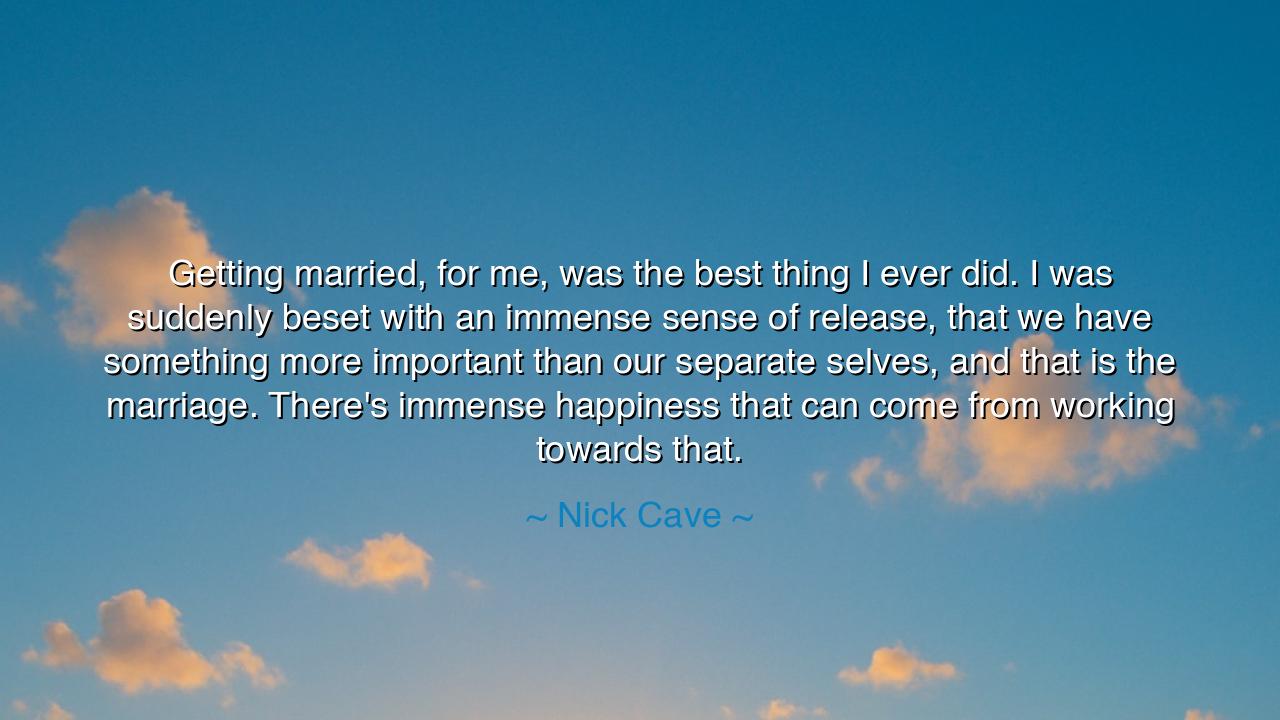
Getting married, for me, was the best thing I ever did. I was
Getting married, for me, was the best thing I ever did. I was suddenly beset with an immense sense of release, that we have something more important than our separate selves, and that is the marriage. There's immense happiness that can come from working towards that.






“Getting married, for me, was the best thing I ever did. I was suddenly beset with an immense sense of release, that we have something more important than our separate selves, and that is the marriage. There's immense happiness that can come from working towards that.” Thus spoke Nick Cave, the poet of shadows and song, whose art has long walked the border between anguish and grace. In these words, he lays bare a truth as old as love itself — that in marriage, two souls are bound not merely in affection, but in sacred purpose. He reveals that the union of two beings is not the imprisonment of the self, but its liberation — for when love transcends individuality, it creates something eternal.
The meaning of his words is luminous. He speaks of a paradox that the ancients knew well: that true freedom is not found in isolation, but in devotion. The world tells us to guard the self above all things — to preserve our independence, our desires, our autonomy. But Cave reminds us that there is a higher freedom — the release that comes when we surrender our self-centeredness to something greater. In marriage, the “I” becomes “we,” and the soul learns that love’s deepest joy lies not in taking, but in giving. To labor together toward a shared life, to bear one another’s burdens, to celebrate one another’s growth — these are the quiet acts of holiness that transform ordinary days into sacred years.
The origin of this wisdom arises not from theory, but from life itself. Nick Cave, known for his music that wrestles with loss, death, and redemption, speaks as one who has endured the darkness and found in love a source of light. His marriage to Susie Bick, a model and designer, came after years of turbulence, heartbreak, and self-destruction. Yet, through union, he discovered peace — not because struggle ceased, but because it gained meaning. The marriage, in his words, became a third thing — something greater than either partner alone, a living spirit born of two hearts beating toward the same horizon. This realization — that love transforms when it becomes service — is what freed him from the tyranny of self.
History offers its own echoes of this truth. Consider Marcus Aurelius, the philosopher-king, who wrote in his Meditations that harmony between two souls is like the harmony of two hands playing one melody. Though emperor, he saw that power and intellect are dust without connection. Or recall Pierre and Marie Curie, whose partnership united science and love; they did not seek glory alone, but worked together in humble purpose, discovering radium and reshaping our understanding of the universe. Their marriage was not the end of individuality, but its perfection — a fusion of minds and hearts toward a single noble goal.
To live by this teaching is to recognize that love is not a feeling to be kept, but a craft to be practiced. The immense happiness Cave speaks of does not arise by accident — it is born from the labor of understanding, forgiveness, and patience. The ancients taught that the sacred fire must be tended daily, lest it fade. So too must marriage be nourished — not by grand gestures, but by the steady offering of attention, gratitude, and kindness. To “work towards” the union, as Cave says, is to transform love from emotion into action, and action into devotion.
And yet, his words carry a deeper resonance still — the reminder that love is the answer to the loneliness that haunts the human heart. In a world that exalts the self, marriage is a rebellion, an act of faith in something beyond one’s own desire. It is the daily declaration that “we” matters more than “I.” Through this surrender, we do not lose ourselves — we find ourselves anew, made whole in the reflection of another. For as Cave implies, marriage is not a chain but a bridge, carrying two souls together toward a shared eternity.
The lesson, then, is both simple and profound: seek not freedom in solitude, but meaning in union. Love is not merely to be felt, but to be built — brick by brick, choice by choice, day by day. When you enter into partnership, do so not for what you may gain, but for what you may become together. Let your marriage — or any bond of love — be your temple, your refuge, your forge. And remember the words of Nick Cave, who found redemption not in art or fame, but in the quiet, steady labor of love: that when two souls commit to something greater than themselves, happiness ceases to be fleeting — it becomes eternal.






AAdministratorAdministrator
Welcome, honored guests. Please leave a comment, we will respond soon